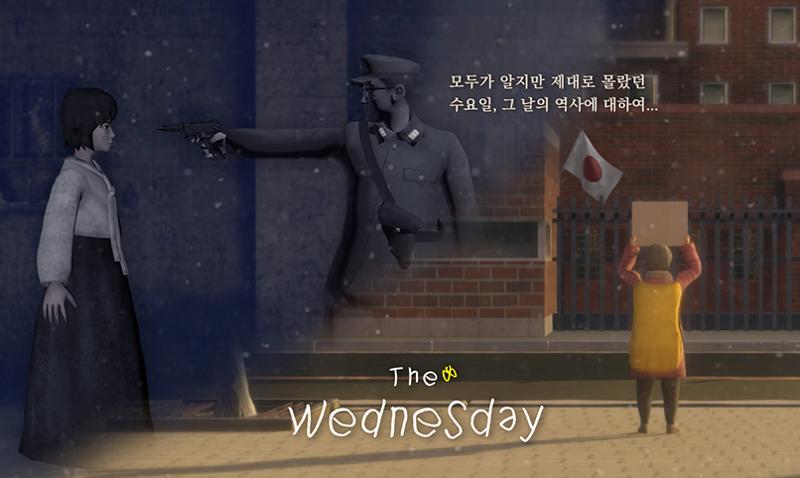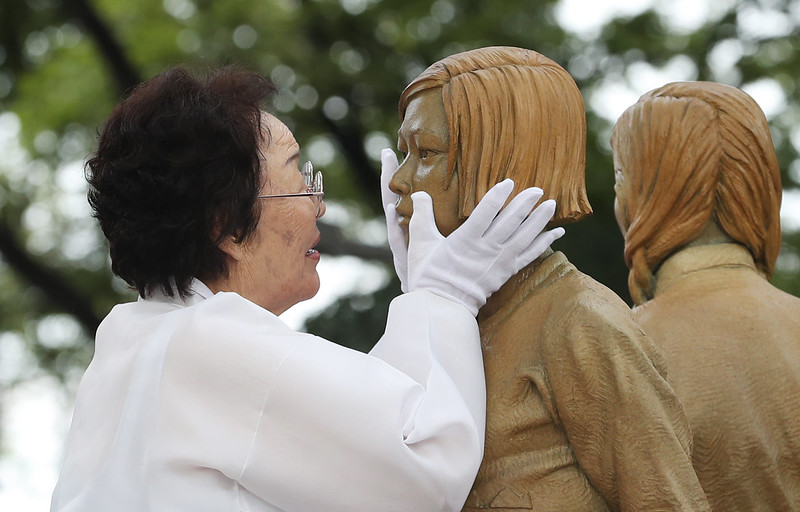
"Wednesday," a game slated for release in November, features the protagonist Sooni, a Korean woman who was forced into sexual slavery by imperial Japan, going back to the past and saving her friends from the victimization. The photo above is a screenshot from the game. (GamBridzy)
By Lee Kyoung Mi and Lee Jihae
"If I could go back in time, I would definitely want to save my friends," said the late Kim Bok-dong (1926-2019), a former "comfort woman," a term used by imperial Japan to euphemistically refer to sex slaves for the Japanese military, and peace activist.
Her impossible dream is now possible through the game "Wednesday," which covers Japan's wartime atrocities committed during the Pacific theater (1941-45) of World War II, including the use of Korean women as "comfort women" for the Japanese military.
The game's name came from the weekly Wednesday protest held at the former site of the Japanese Embassy in Seoul. The protest has been held since Aug. 14, 1991, when Kim Hak-soon first told the world that she was a "comfort woman."
The object of the game is for the protagonist Sooni to jump between the past and present to save her friends by using clues. She meets victims from not only Korea but also other nations such as China, Indonesia and the Netherlands.
Sooni witnesses Japanese wartime atrocities such as the experiments on people conducted by the infamous Unit 731, a branch of the Japanese army, the Nanjing Massacre (1937-38), and the forced conscription and abuse of Allied prisoners of war.
"Wednesday" is the first game in Korea whose theme is the "comfort women," with numerous TV dramas, novels and movies having covered the topic.
Do Minseok, CEO of the game's maker GamBridzy, said, "Many people in the younger generation, especially those in their late teens to early 30 and particularly foreigners, know little about the "comfort women" issue," adding, "I made the game to inform them of the issue through a friendly medium."
He urged the creation of more content in any form for the next generation to know of and preserve such history for a long time, as well as for higher public awareness of the problem to expedite a solution.
Hwang Youjung, the creator of the game's overall plot, stressed raising global awareness of the issue. "The reason people don't use the Nazi swastika is that they know why they shouldn't use it. The reason people use (Japan's) 'rising sun' flag as a fashion item is that they don't know how much it hurts others and are unaware of Korean history," she said.
The "comfort women" were not only from Korea but also from China, the Netherlands and Australia, Hwang added. She said she thus created the game to raise global awareness of this crime against humanity.
To encourage more people to play the game, she said she adjusted its levels of difficulty and made it more appealing to younger people. The game will be released in six languages: English, Chinese, Japanese, German, French and Dutch.
"Wednesday" had its potential confirmed after being included on Korea Creative Content Agency's 2019 list of functional game projects eligible to receive aid in production. Crowdfunding for the game was held early this year and raised more than three times the targeted amount, showing public support for "Wednesday."
But the game has faced criticism for presenting the "comfort women" issue through an entertainment medium such as games, given the topic's highly sensitive nature.
GamBridzy spoke of the game's positive effect on the issue, saying, "The game has a big learning effect because unlike other content such as movies or webtoons (online comics), a user grows aware of and focused on the problem by becoming the character ."
Games released abroad dealing with historical incidents do have a record of bringing about social change.
"This War of Mine," a Polish game showing the horrors of the Bosnian War (1992-95), has seen sales of more than KRW 10 billion. The maker also donates a portion of the game's proceeds to the charity organization War Child, which helps children in war zones, thus helping hundreds of children orphaned by armed conflict.
"Detention" is a Taiwanese game set during the 1960s, when the island nation was gripped by a tense social atmosphere due to martial law. The game drew acclaim for raising user interest worldwide in Taiwanese culture and history.
GamBridzy said it is thoroughly vetting data at both home and abroad to minimize criticism of its game.

Sex slave victim Lee Yong-soo on Aug. 14, 2019, touches a "comfort woman" statue near the former site of Joseon Shingung in Seoul's Jung-gu District on the occasion of International Memorial Day for "Comfort Women." (Kim Sunjoo)
The company initially planned to release the game on Aug. 14 to mark International Memorial Day for "Comfort Women," but COVID-19 changed that. It also faced criticism for being introduced in a Japanese online community around March 1, March First Independence Movement Day, thus the release date was postponed to November to avoid further attacks.
Do said he hopes that "Wednesday" is a gate to attract the younger generation to eventually reach a solution to the "comfort women" issue, and that the game will spark curiosity among players and encourage them share such thoughts with others.
Though the issue was first publicized worldwide 29 years ago, the Japanese government has yet to send an official apology to the victims. The problem's lack of resolution attests to the need for this ongoing history to be more widely known.